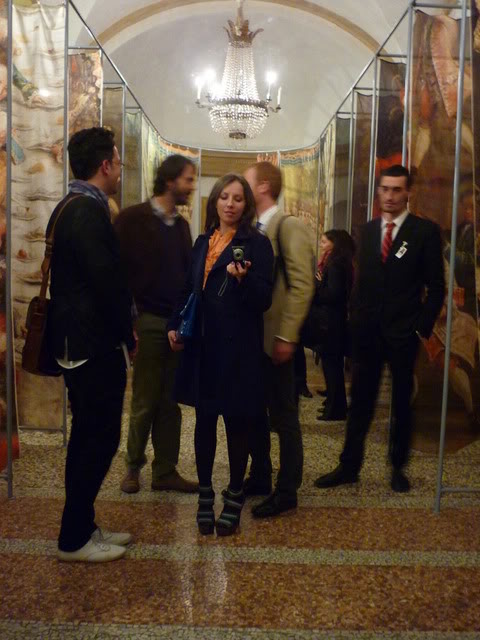Felipe Fernández-Armesto, professor of history at Queen Mary College, London
Bad times are just around the corner. We can't even enjoy the schadenfreude of the fat cats' failures. Central banks throw good money after bad, down the sewers of the City and Wall Street.
There is no escape from the apparent meltdown of capitalism. Portents of cataclysm multiply. AIG teeters, with trillions of dollars sunk in bad bonds. Merrill Lynch sells out for a pittance. Even Goldman loses the Midas touch and is left with the ass's ears.
But can it really be that bad? While people are suffering, it may seem cheeky to celebrate financial catastrophe. Yet history is full of examples of poverty redeemed by great achievements.
For one thing, the arts tend to benefit. The Renaissance would probably never have happened without the hard times that made investors in 15th-century Italy turn away from get-rich-quick schemes and invest in culture. Botticelli did some of his best, highest-minded paintings after the Medici Bank crashed in 1494.
In the Bonfire of the Vanities the revolutionaries burned the glitz and erotica that passed for art but the new generation of artists who stepped into the vacant niche included Michelangelo and Leonardo.
When the South Sea bubble burst, England enjoyed the glories of the “Augustan” age of poetry and design. The recession of the Thirties inspired Hollywood with a wonderful series of riches-to-rags, rags-to-riches movies, which in their turn helped ordinary people follow Fred Astaire's advice: “Dust yourself off and start all over again.”
Though art requires patronage, most of it comes pretty cheap. Most great art happens in garrets. Short rations stimulate vast visions.
Unemployment pay has done more than the Arts
Council to keep the arts alive. The arts in Britain have been corrupted into trashiness by high prices, easy money, and the curse of celebrity values. Austerity might trigger a new era that may not glisten but may yield real gold. And some things that are better even than art thrive in adversity: love, spirituality, friendship, humanity, trust. Clichés have one great virtue: they tend to be true. It really is easier for a camel to pass through the eye of a needle than for a rich man to enter heaven. Money really can't buy love. Mimi showed great taste in loving Rodolfo and leaving her fat-cat protector in La Bohème.
Comfort induces bovine contentment but is hostile to happiness, which is a dynamic state that emerges from struggle. Unemployment is evil but can be turned to good: enforced leisure is, at least, leisure. Financial worries corrode the soul and can poison relationships; but when extreme adversity teaches us to cope with them, their menace ebbs.
Abundance is bad for you. A tighter-belted Britain would be less obese, less profligate, less self-indulgent, less stuffed with junk food and trash values. The less surplus you have to splurge, the less likely you are to take the kind of mad risks that have wrecked so many big businesses.
The common culture we have discarded over the past half-century was never very good. The patriotism was jingoistic, the religion shallow, the “family values” sometimes oppressive, the social disciplines tainted by class-consciousness. But we have discarded them without finding anything worthwhile to share in their place.
A spell of austerity will concentrate our minds. We will rethink the economic dogmas inherited from the era of Reagan and Thatcher. We'll see the virtues of democratically regulated economies. We'll close the wealth gaps that have disfigured society with unconscionable inequalities.
We'll start relying more on the networks of families, friendships and neighbourliness in revulsion from unrestrained individualism and the cult of competition. I hope we'll regulate the markets so that incompetent executives can no longer work up billions of dollars of debt before taxpayers have to rescue them.
And if we really learn from experience, we'll never again allow predatory directors to milk their businesses, stiff their shareholders and insult their workers with obscene differentials in pay. We may even end up happier.
When Wall Street suffered its worst-ever crash in 1929, the media overflowed with stories of financiers' suicides. Most turned out to be hysterical inventions that passed into urban legend. There is life after losses. People who can find the strength and support among their families and friends to live through austerity will recover some, at least, of their lost comforts.
Disaster makes people rethink their lives. People who realise, through hard experience, that they can do without luxuries cannot be corrupted by their possessions. Prosperity will re-emerge, and it may again threaten to infect us with greed. The question is not whether we will get through straitened circumstances but whether we will use them to make society better.
With little to lose, I feel indemnified against the worst effects of the current disaster. As I watch financial panic from the security of my own modest circumstances, the spectacle reminds me of the closing scene of an adventure movie. Disaster buries the longed-for treasure or the forbidden city. The heroes escape, safe but impoverished. The baddies, who cannot bear to abandon their hoard, get squashed in the crash.
It's one of the oldest story-lines in the world. The Bible has a formula for dealing with the debacle that follows corruption, materialism and greed. When Sodom and Gomorrah buckle and crumble, anyone who looks back is lost. But Lot is happy to escape with his life. The moral is clear. Don't look back.



